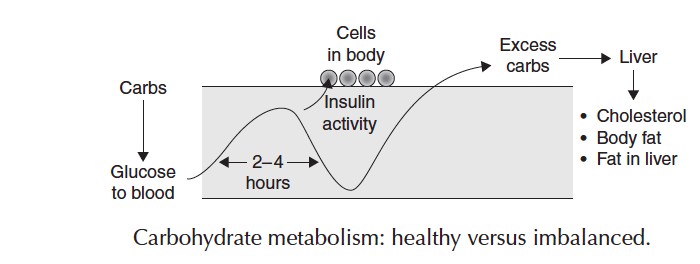Excess carbohydrates and sugar lead to cholesterol and weight gain, explains Dr. Doni Wilson, which is why balancing blood sugar levels every day is so important.
When you go to the doctor and get a cholesterol reading, you may be cautioned against eating high-fat foods. But very little fat from foods becomes cholesterol in your blood. What produces cholesterol is rather the excessive consumption of carbs at any one time. The cholesterol and triglycerides in your bloodstream come not from consuming excess fat, but rather, from consuming excess glucose.
I’m not just talking about excess glucose over the course of a week or even a day. I’m talking about what happens when you consume excess glucose in one sitting.
Let’s take a closer look at exactly happens when your body gets too many carbs at one particular meal.
First, you digest the carb-containing food, breaking it down into the individual glucose molecules that are small enough to cross the cells of your intestinal walls and enter your bloodstream. Because you have eaten too many carbs, you have far too much glucose stuck in your blood. You don’t have enough insulin to move all that glucose into your cells. So what happens to that excess glucose?
Some of it is stored in your liver as a substance known as glycogen, to be released when you don’t eat. Harking back to our hunter-gatherer days, our bodies created a backup system to ensure that even if we can’t get any food for a couple of days, we won’t starve to death.
The liver can only hold so much glycogen, however. So what about the glucose that doesn’t fit? Your body has three choices:
- convert the glucose into body fat, which translates into weight gain, most likely around your middle;
- convert the glucose into lipids (fats), which remain in your bloodstream as cholesterol and triglycerides;
- convert the glucose into fat that is stored in the liver, leading to a condition known as “fatty liver.”
If you overdo it on the glucose every once in a while, this process is not really so dangerous. But if you regularly eat large amounts of glucose in a single meal—even if you avoid it for the rest of the day—your body begins to adapt to these large infusions of glucose in ways that are highly problematic.
First, your body registers that you have too much glucose in your bloodstream for the amount of insulin that is there… so your pancreas starts making more insulin. Your body experiences the high insulin levels as a “stress messenger,” with two very troubling results:
- Inflammation, which contributes to a host of health problems. Some of these issues are relatively minor, such as acne, colds, and infections— but some issues are very serious, such as cardiovascular disease, autoimmune disease, and cancer.
- Adrenal stress, which likewise contributes to a host of health problems, including weight gain, diabetes, and high blood pressure.
Meanwhile, the inflammation produced by the excess insulin also creates extra body fat. The extra insulin in your system also leads to extra body fat. And, in a truly vicious cycle, extra body fat creates still more inflammation.
The ultimate bad end of this negative synergy is what doctors term “Syndrome X” or “Metabolic Syndrome,” in which the patient faces a quadruple threat: high blood pressure, high blood sugar, high triglycerides, and excess weight. This creates a greatly increased risk for cardiovascular disease, stroke, and diabetes.
The good news is that there is a solution: rebalance your carbohydrate metabolism. Read my 5 tips to start balancing your blood sugar here.
When you feed your body according to your physiology—getting the right amounts of carbs distributed evenly over time—you are giving your body the amounts of glucose that perfectly match your insulin’s ability to get that glucose into your cells.
If there happens to be a little glucose left over, it can go into your glycogen storage. But your body is never getting so much glucose that it has to be converted into body fat or cholesterol.
Adapted from The Stress Remedy: Master Your Body’s Synergy and Optimize Your Health, a book by Dr. Doni Wilson, available at TheStressRemedy.com and at Amazon.
